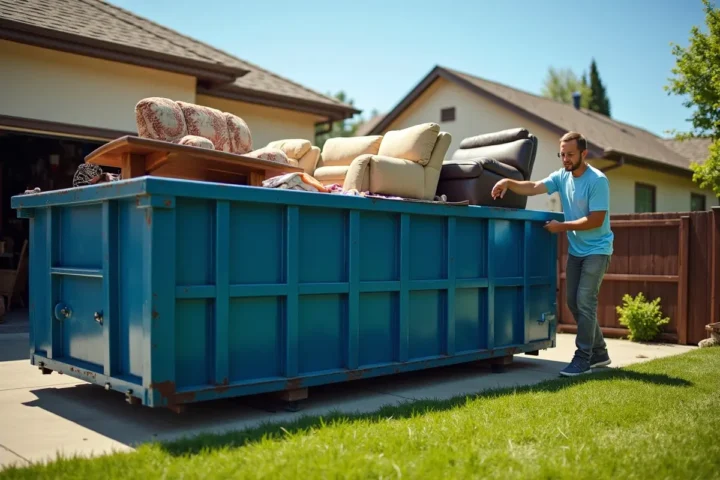What You Can and Can’t Throw in a Dumpster: A Practical Guide
Proper waste management is essential in any home renovation, cleanout, or construction project. Renting a dumpster often allows you to dispose of unwanted debris easily, but if you don’t know what you can or cannot discard, you could run into some problems down the line. Being informed about waste disposal protects the environment and individuals handling your waste. It will also help you avoid expensive fines or a delay with your project.
Being aware of what the dumpster allows helps you if you are currently decluttering your home or are about to undertake a substantial remodel. If you are looking for a rapid solution in your own community, dumpster rental Mocksville, NC services can help you to find the right size and type of dumpster for your rental needs.
Becoming informed about guidelines is not only for convenience but also legal requirements and responsible waste management. Most household wastes and construction waste are legal and safe to discard in a dumpster. However, there are certain wastes, specifically hazardous chemicals or electronics that require special attention due to their environmental effect.

Items You Can Dispose of in a Dumpster
A dumpster rental can accept most general refuse from home projects or yard cleanouts.Here are some common items you can put in the dumpster:
- Household Junk: Unused furniture, worn clothing, boxes of toys, and other non-regulated household junk can typically go in a dumpster.
- House Construction and Remodeling: Most dumpster rental companies accept lumber, drywall, tile, flooring, and shingles making them appropriate for construction and renovation projects.
- Yard Waste: Twigs, leaves, and lawn clippings are often acceptable in dumpsters. However, please verify local codes regarding whether yard waste should be placed in a dumpster or elsewhere.
- Non-Refrigerant Appliances: Staying with the theme of non-regulated junk, dishwashers, stoves/ovens, washer, and dryers can typically go in a dumpster as long as they do not contain refrigerants or hazardous fluids.
Items Prohibited from Dumpster Disposal
Although you can dispose of numerous types of materials in a dumpster, you cannot dispose of some materials in one. These banned items are put in place to safeguard landfill environments and keep sanitation workers and the community safe.
- Hazardous Materials: Things like paints, automotive fluids, solvents, pesticides, asbestos, and batteries cannot be placed in a dumpster. These materials are regulated because they are toxic or flammable. Visit the U.S. Environmental Protection Agency for information on health risks and other options for dealing with hazardous waste.
- Electronics: Televisions, computers, and cell phones may contain heavy metals or chemicals that should be recycled, by electronic recycling waste providers, instead of just throwing them away.
- Tires: Landfills do normally not accept whole tires because they can trap gases and disrupt the landfill layers. Tire recycling programs often find new uses for tires, such as resurfacing for roads or playground mulch.
- Medical Waste: Medical waste disposal services properly handle the disposal of items like syringes, expired medications, and other medical waste. These items present potential health risks to those who handle the waste and often have strict disposal laws.
Special Considerations
It may be possible to dispose of certain materials, but they may either require special preparation, or acceptance will be conditional.
- Mattresses and Box Springs: In some localities, disposal of mattresses and box springs could be possible, but often this will incur an additional cost because of their size and materials. Always confirm with your local disposal provider.
- Appliances with Refrigerants: Refrigerators, air conditioners, and freezers must have had their refrigerant released by a certified technician prior to disposal in order to comply with environmental regulations concerning chlorofluorocarbon (CFC) emissions.
- Large Amounts of Yard Waste: If your locality has strict composting or green waste separation laws, the branches and clippings must comply with municipal rules before disposal. Alternatively, any municipal organization that composts yard waste could be another option for disposal.
Local Regulations and Guidelines
Because your local government or waste company establishes unique requirements, you must take specific action regarding the rules about what you can throw in a dumpster. In some cities, regulations require that residents recycle or dispose of certain items separately, like mattresses, electronics, or yard waste.
Always check with your dumpster rental company or local solid waste authority about the rules for your whenever possible and check to see if you need special permits and extra fees. Following the local rules is the best way to avoid fines and be an active participant in your local communities waste disposal and recycling efforts.
Final Thoughts
Before putting items into a dumpster, it is important to check the prohibited items list and requirements listed by the local town or dumpster rental company. With some thoughtfulness, you will be able to do your job in a legal, orderly, and environmentally conscious manner. If you are unsure, search for other disposal or recycling options for hazardous, electronic, and regulated waste streams to keep your community and the environment safe.


